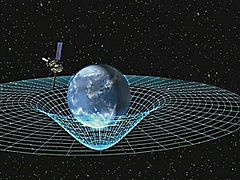| Part of a series on |
| Spacetime |
|---|
 |
In physics, curved spacetime is the mathematical model in which, with Einstein's theory of general relativity, gravity naturally arises, as opposed to being described as a fundamental force in Newton's static Euclidean reference frame. Objects move along geodesics—curved paths determined by the local geometry of spacetime—rather than being influenced directly by distant bodies. This framework led to two fundamental principles: coordinate independence, which asserts that the laws of physics are the same regardless of the coordinate system used, and the equivalence principle, which states that the effects of gravity are indistinguishable from those of acceleration in sufficiently small regions of space. These principles laid the groundwork for a deeper understanding of gravity through the geometry of spacetime, as formalized in Einstein's field equations.